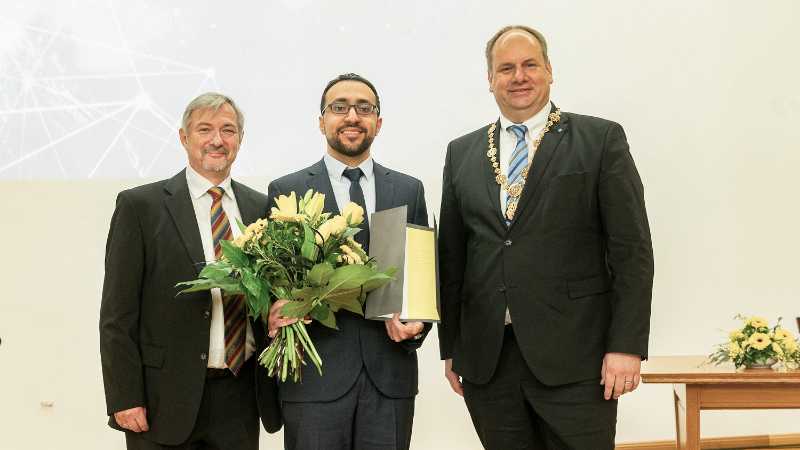On 29 Feb 2020, the City of Dresden, together with the network “Dresden – Stadt der Wissenschaften” (Dresden – City of Science), presented the DRESDEN EXCELLENCE AWARD for outstanding final theses for the third time. The prize was endowed with a total of € 30,000. One of the four awards went to former DIGS-BB doctoral student Dr. Nicola Mitwasi for his dissertation "Antigen-specific redirection of immune effector cells against GD2-expressing tumors".
“With the Science Prize of the City of Dresden, we as the city administration are honouring four graduates of Dresden universities for the third time in a row for their outstanding scientific theses. This recognition strengthens the perception of Dresden as an excellent science location” says Lord Mayor Dirk Hilbert, who also served as chairman of the jury.
Nicola Mitwasi from the Medical Faculty of TU Dresden and the Helmholtz Zentrum Dresden-Rossendorf (HZDR) was honoured for his excellent doctorate. The Bethlehem-born immunologist convinced the jury with his cancer research “Antigen-specific redirection of immune effector cells against GD2-expressing tumors” for immune-based therapies as an alternative approach for the safe and effective treatment of cancer. The focus of Nicola’s doctoral thesis was on the development of various novel therapeutic molecules against cancer by redirecting genetically engineered immune cells called UniCARs, which were developed in the research group of Prof. Dr. Michael Bachmann (HZDR). Nicola succeeded in developing various antibody-based molecules and demonstrated their ability to destroy tumor cells using manipulated immune cells (UniCARs).
Source: TU Dresden
DIGS-BB Interview with Nicola
What do you think would be the impact of this award on your career?
Dresden Excellence Award gave me a huge motivation to pursue my career in scientific research. I believe that it is important for a scientist to see that his work is recognized, and has a positive impact on the society.
What are your goals or plans for the next career steps?
I would like to continue doing research in the field of immunotherapy, because it represents a real promising approach that already showed a very positive clinical outcome. However, there is still many hurdles that need to be addressed in order to improve and optimize the treatment of solid tumors. Therefore, I hope that by pursuing a career in this field, I will get the chance to tackle some of these hurdles.
How do you think your thesis project and findings will contribute to the improvement of immune-based cancer therapies?
In my PhD thesis, I worked with the UniCAR technology, which was development in Prof. Bachmann group. This technology provides a safety switch for engineered immune cells in order to improve safety of patients. My project had two main purposes, the first is apply the UniCAR technology on different immune cells including a stable immune cell line that can be expanded for the treatment of many patients. You can think of it as a universal therapy or as we call it an off-the-shelf product. This would actually reduce the cost and the time needed to produce the therapy tremendously, which will be very beneficial for the patients at the end.
The second purpose was to develop therapeutic molecules that can be used for the treatment of cancer by redirecting of UniCAR-immune cells as well as for the imaging and detection of cancer. Such molecules are Theranostic molecules (diagnostic and therapeutic).
At the end, I was able to achieve both missions successfully. Therefore, my project, which is a small touch in a much larger picture, will provide a novel insight on the flexibility and the high potential of immune-based therapies to fight cancer.
In what way has the DIGS-BB and its scientific community supported your research?
DIGS-BB has provided a rich environment for personal development through trainings, symposiums and various activities that allowed us to exchange experiences, expertise and to gain an insight on various fields (scientific and non-scientific). Moreover, the structure of the program, especially the TAC meetings, gave us the opportunity to receive feedback regarding our projects from professionals of different background.
In general, Dresden provides a solid infrastructure for scientific research and a fertile soil for collaborations and experience exchange between the different fields of science.
